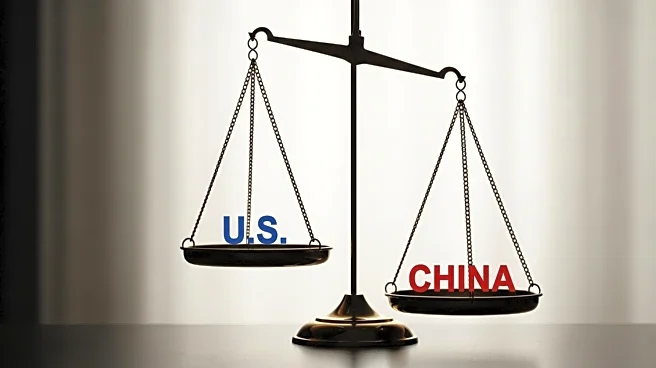What's Happening?
Frank Lavin, a fellow at the University of Southern California and former Undersecretary for International Trade during the Bush administration, has expressed optimism regarding the potential for de-escalation in U.S.-China trade tensions. Lavin highlighted the temporary nature of China's global export controls, suggesting that these measures are unlikely to be permanent. He described the current situation as a 'lose-lose' for both nations, indicating that there is room for resolution. Lavin's comments come amid ongoing trade disputes and economic uncertainties between the two countries, which have significant implications for global trade dynamics.
Why It's Important?
The potential de-escalation of trade tensions between the U.S. and China is significant for several reasons. Firstly, it could lead to improved economic relations and stability in global markets, benefiting industries reliant on international trade. Secondly, easing tensions may reduce the risk of further retaliatory measures, which can disrupt supply chains and increase costs for businesses and consumers. Additionally, a resolution could foster better diplomatic relations, paving the way for future cooperation on broader issues such as climate change and security. Stakeholders in both countries, including businesses and policymakers, stand to gain from a more stable and predictable trade environment.
What's Next?
If Lavin's predictions hold true, stakeholders can expect potential announcements or negotiations aimed at reducing trade barriers and export controls. This could involve diplomatic talks or policy adjustments from both the U.S. and China. Businesses and investors will likely monitor these developments closely, as any positive movement could influence market confidence and investment strategies. Furthermore, political leaders may engage in discussions to address underlying issues and prevent future escalations, potentially leading to a more collaborative approach in international trade relations.
Beyond the Headlines
The broader implications of a U.S.-China trade de-escalation extend beyond immediate economic benefits. It could signal a shift towards more cooperative international relations, influencing global geopolitical dynamics. Additionally, resolving trade disputes may encourage other nations to pursue similar diplomatic solutions, fostering a more interconnected and stable global economy. The ethical dimension involves balancing national interests with global responsibilities, as both countries navigate complex trade and political landscapes.









